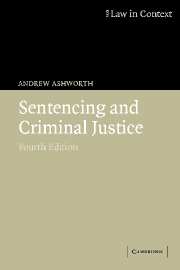Book contents
- Frontmatter
- Contents
- Preface
- Table of statutes
- Table of cases
- 1 An introduction to English sentencing
- 2 Sentencing and the constitution
- 3 Sentencing aims, principles and policies
- 4 Elements of proportionality
- 5 Aggravation and mitigation
- 6 Persistence, prevention and prediction
- 7 Equality before the law
- 8 Multiple offenders
- 9 Custodial sentencing
- 10 Non-custodial sentencing
- 11 Procedural issues and ancillary orders
- 12 Special sentencing powers
- 13 Conclusions
- References
- Index
9 - Custodial sentencing
Published online by Cambridge University Press: 05 June 2012
- Frontmatter
- Contents
- Preface
- Table of statutes
- Table of cases
- 1 An introduction to English sentencing
- 2 Sentencing and the constitution
- 3 Sentencing aims, principles and policies
- 4 Elements of proportionality
- 5 Aggravation and mitigation
- 6 Persistence, prevention and prediction
- 7 Equality before the law
- 8 Multiple offenders
- 9 Custodial sentencing
- 10 Non-custodial sentencing
- 11 Procedural issues and ancillary orders
- 12 Special sentencing powers
- 13 Conclusions
- References
- Index
Summary
The aim of this chapter is to examine the law and practice relating to custodial sentences. Imprisonment involves deprivation of liberty and is the most onerous and intrusive sentence available in this and other European countries. Deprivation of liberty and incarceration in a punitive institution require special justification. To begin that process, it is necessary to understand the practical meaning of custodial sentences. This depends on the various provisions for calculating the proportion of the nominal sentence that the offender will spend in custody, on the conditions in which prisoners are held, and on the terms on which they are later released. The chapter begins with an outline of the state of English prisons. It then considers principles and policies for the use of custodial sentences, assessing the extent to which the principle of restraint, the policy of bifurcation or a blurred approach best characterizes English sentencing. There is then an analysis of the statutory threshold for imposing custody, and also the prevailing approach to long custodial sentences, noting significant changes introduced by the 2003 Act. The chapter concludes with a brief discussion of various groups of prisoners who raise particular issues of principle.
The use of incarceration and deprivation of liberty as a punishment raises fundamental questions of social and penal policy, as well as engaging several individual rights declared by the European Convention on Human Rights.
- Type
- Chapter
- Information
- Sentencing and Criminal Justice , pp. 255 - 292Publisher: Cambridge University PressPrint publication year: 2005



